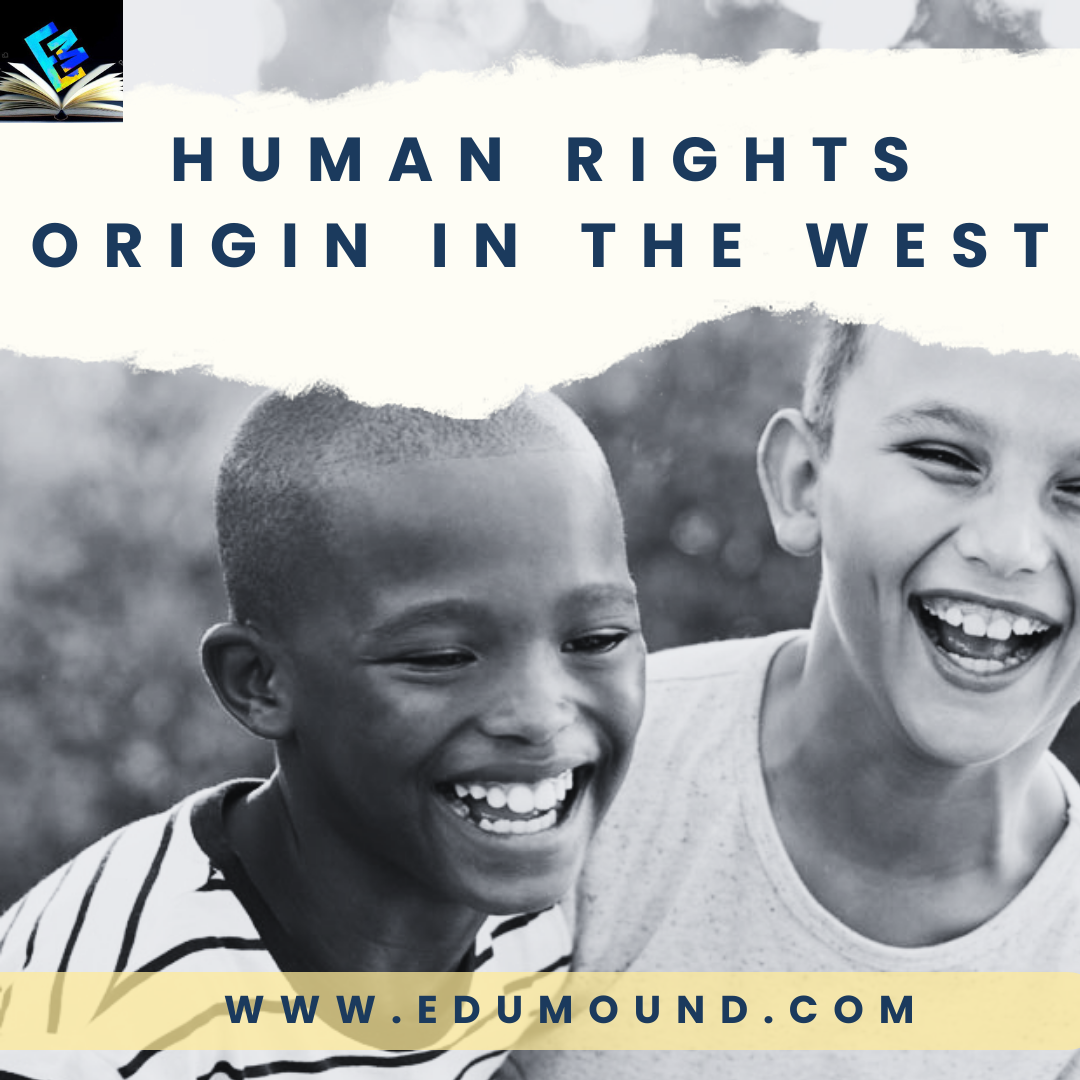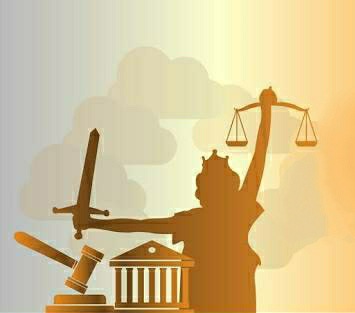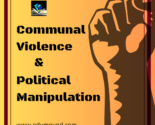
Human Rights Origin In the West
Introduction
The concept of human rights is innate with the very origin of the human race. Human beings by virtue of their very existence possess certain rights that are inherent to them. The first and foremost Right is the Right to Life, which further gives rise to various other rights facilitating and improving the quality of life.
These inherent rights were however not codified or enforced in a formalized manner and such as were shattered and trampled upon by aristocracy and riches for ages. Evils of Apartheid, slavery, religious persecution, gender discrimination, child exploitation prevailed. The Large Stature of power shadowed individual rights and the world started revolving around the powerful. It was only after World War II, that the world realised that human rights need to be protected and enforced at a global level.
The Concept of Human Rights
Human rights are a relatively new notion. Anciently, ‘Natural rights’ of man was the term given to them. Natural rights at the period primarily included the rights to life, liberty, and the pursuit of happiness. Human Rights are those rights that are inherent in human existence and are shared by all humans, regardless of gender, race, caste, or religion. Similar to the various concepts such as Freedom, Equality and Democracy, it is a very cumbersome task to define Human Rights also because there is no single and simple conception of its real meaning.
In an attempt to crystallise the concept David Selby put forth a definition which goes as: “Human Rights pertain to all persons and are posed by everybody in the world because they are human beings they are not earned, bought or inherited, nor are they created by any contractual undertaking”.[1]
To put simply, The fundamental rights that every human being is obligated to enjoy as a result of his or her status as a human being irrespective of other considerations, a member of the human family. Human Rights are important rights both for the individual and collective good.
The Development
Darwin’s hypotheses ‘Might is Right’ and ‘Survival of the Fittest’ have Universal applicabilities. Those with power are more likely to ridicule and exploit the weak. While the fittest will. In all eras and ages, people have tried to exist at the expense of other people’s rights. Human Rights came into being since the advent of civilization. Without society, man is unimaginable, and without society, rights are worthless. Human Rights became a fundamental aspect of society as civilisation progressed. Human Rights have developed as a result of a variety of elements and causes, including the nature of society, people’s needs, society’s values or norms, social, political, and economic conditions, and, above all, scientific breakthroughs and discoveries that have transformed human life.
Origin
The Beginning
In the West, the pioneer document recognising the concept of rights and asserting individual rights for the first time ever was the ancient Magna Carta 1215. Later by the years several attempts were made, numerous documents came into picture including the English Bill of Rights (1689), the French Declaration on Rights of Man and Citizen (1789), and the US Constitution and Bill of Rights (1791),. Though these ancient documents failed to explore distinct needy arenas such as women rights, rights against racism, slavery, social and political rights of the various oppressed groups and therefore were disregarded through the years, yet, to some extent all of these acted as the precursors for the present codified humanitarian law.
The Wake Up Call
The world however revolved at its usual pace without paying much heed to the exploited ones. The weak and marginalized ones were oppressed, deprived of their basic human needs and rights and persecuted. Their rights were trampled upon at the whims and fancies of the capitalist and the aristocratic societies. Exploration and persecution attained peaks, wars destructed humanity, oppression crushed the people but the world remained unhindered.
And at last, the Hilter regime and rise of Nazi Germany horrified the world. The mass extermination of the human race, killing of over six million people including Jews, Romani, Sintis, Disabled persons and Homosexuals was the worst that the world could witness. It took a whole of World War II, and resulting destruction and murder of humanity, to wake the conscience of the slept and for the ‘so called’ world leaders to realize that it was time that issues need to be addressed that the world was in a dire need of protection of rights. That in order to prevent history from repeating itself again, people need to realise their rights and constraints are to be put on the unrestrained tyrannical powers. To all of this the simplest answer was Codification.
Codification of the rights that people held but did not realise, Codification of a law that restrains unfettered powers and tyranny and curb oppression and discrimination at its very roots. The establishment of the United Nations became a one stop solution to all of these.
The Codification
After the war ended global re-engineering began, leaders met, solutions were discussed. Alongside trials were held at Nuremberg and Tokyo and the officials of the defeated countries were punished for commission of war crimes, “crimes against peace,” and “crimes against humanity.
The failure of the League of Nations and the outbreak of World War II, was much of a lesson to the world and keeping all the loopholes in light, with an attempt to overcome all the setbacks, the United Nations was established. An organization with a wider scope, greater delegated powers and sterner authority. A need to set global standards of humanitarian law that stand unfettered against largely oppressive powers, that could hold the rights of the citizens above the whims of national politics, and ones that could hold international institutions, world powers and national government accountable in case of unreasonable exploitation, was sought to be quenched with the establishment of the United Nations .
Governments then engaged to form the United Nations with the primary purpose of promoting world peace and conflict prevention. People wanted to make sure that no one was ever denied life, liberty, food, shelter, or nationality in an unjust manner again. President Franklin D. Roosevelt’s 1941 State of the Union Address encapsulated the heart of these evolving human rights ideas when he spoke of a world built on four vital freedoms: freedom of speech and religion, freedom from want, and freedom from fear (See Using Human Rights Here & Now). Human rights norms to protect civilians from government abuses have been called for from all across the world. whether countries could be held responsible for the treatment of people living within their borders These perspectives were crucial in the 1945 meeting in San Francisco that created the United Nations Charter.
As soon as the United Nations came into existence, with a goal of recognition and declaring at large the inherent human rights, a drill to formulate a charter of human rights began.
The Universal Declaration of Human Rights
The United Nations’ member nations are committed to promoting universal respect for human rights. To help achieve this goal, the United Nations created the Commission on Human Rights, which was tasked with creating a text that clarified the meaning of the Charter’s fundamental rights and freedoms. The Commission drew worldwide attention thanks to Eleanor Roosevelt’s tenacious leadership.
On December 10, 1948, The United Nations’ 56 members unanimously endorsed the Universal Declaration of Human Rights (UDHR). Although eight countries abstained, none opposed, thus, the vote was unanimous.
The Universal Declaration of Human Rights (UDHR)[2], also known as the international Magna Carta, built on the revolution in international law ushered in by the United Nations Charter, namely, that how a government treats its own citizens is now a legitimate international concern, not just a domestic issue. All rights, it maintains, are interrelated and indivisible. Its Preamble asserts that, The recognition of all members of the human family’s inherent dignity and equal and inalienable rights is the foundation of world freedom, justice, and peace.
The United Nations Declaration on Human Rights (UDHR) has had a significant impact. Most of the UN’s more than 185 member countries have integrated its ideals into their constitutions. Despite the fact that a statement is not legally enforceable, the Universal Declaration has gained the status of customary international law because it is seen as “a shared standard of achievement for all people and all nations.”
Are international human rights largely a western Concept?
The Western domination in the world is an undeniable truth. The impact is not limited to the cultural and economical arenas but to the very roots of our life. In the 19th and 20th century while the rest of the world was yet in its developmental stage, struggling for their rights and freedom, Western domination was at its peak, as a result the world politics revolved on their fancies. The reflection is to be seen in the structures of the major international organisations, treaties, laws and charters. In this wake, a recent trend has been a debate upon the origin and development of human rights as prevalent in the world, being a largely Western Concept.
Critics assert that Human rights are the expressions of Western ideas, mores, and customs, as opposed to their asserted universality. Though human rights are considered to have universal validity, many argue that they originated in the West, represent Western objectives, and are thus a tool of cultural hegemony or a new type of imperialism. Others claim that human rights are derived from a European, Judeo-Christian, and/or Enlightenment heritage (usually referred to as “Western”) and cannot be enjoyed by cultures that do not share “Western” nations’ conditions and ideals.
While, on the counter it is argued that Human rights, as under the Western cultural construct, provide for inherent and inalienable rights that apply to everyone, regardless of culture or tradition. Human rights are restricted in non-Western civilizations, but only when they infringe on the cultural and customary rights of their members. These cultural traditions, such as Sharia law and female circumcision, challenge the cultural basis of human rights by offering alternative perspectives on the individual and their place in society. As a result, cultural relativists who defend each culture’s freedom to vary, even if it blatantly violates its members’ rights, are incorrect in suggesting that human rights is a sort of cultural relativism.
The debate lies to the world for exploration and assertion however it is worthy to be mentioned that What these critics’ narratives leave out is the central struggle and experiences that gave rise to the plethora of international human rights instruments and processes in use today. Injustices are common in all cultures, Western and non-Western alike, and they lead to calls for human rights recognition from oppressed communities, which lead to human rights reforms. This “common experience with injustice” serves as an authoritative foundation for developing a theory of rights.
Conclusion
To conclude, the concept of human rights was never alien to the human race and was inherited with our very inception, however the crystallization of the same to an enforceable form lied as a challenge. With numerous attempts over centuries we have succeeded in formulating the universally acceptable regulations. The enforcement of the same however, still lies as a huge challenge before the whole of humanity.
The concept of human rights can be simplified as, As a member of human society, man has certain rights in order to live and improve his life; thus, Human Rights are concerned with individual dignity and the environment. A high level of self–esteem that protects one’s identity and encourages a flourishing human community. In a nutshell, Human Rights are globally recognised rights, concepts and regulations that promote morality and make it possible for each individual to live a moral life, members of the human family to reach their best potential and live life to the fullest in a climate of liberty, justice, and peace.
In today’s social and political environment, the human rights debate is rife. It shapes the way we think and act in large part because it dictates how we understand justice. Despite its popularity and general acceptance, however, this discourse is not without flaws. The question of whether human rights are universal or relative in application is one of the more persistent, significant, and well-documented issues surrounding them.
Bibliography
- David Selby, Human Rights (Modern World Issues), Cambridge University Press (July 31, 1987
- Historical Background Of Human Rights: Western And Indian PerspectivesInternational Journal of Information Movement Vol.2 Issue XI(March 2018)
- Juliet Rogers, Western Human Rights in a Diverse World: Cultural Suppression or Relativism?, University of Melbourne
- Human Rights: History, Nature, Western And Indian Perspectives.
- Is “Human Rights” a Western Concept?, October 17, 2018Ahmed Shaheed and Rose Parris Richter
Footnotes
[1] David Selby, Human Rights (Modern World Issues), Cambridge University Press, July 31, 1987
[2] United Nations, 1948, art. 21.3
FOR MORE INFO VISIT US!
OR Mail us at edumoundofficial@gmail.com
Read similar Articles – Human Trafficking as Violation Of Human Rights






